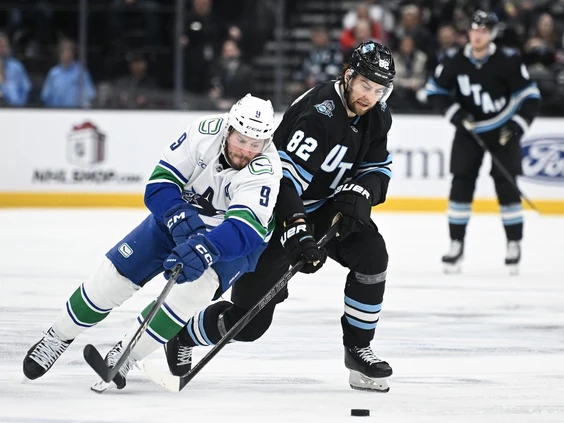“It’s one thing to be a star on a mediocre team. It’s one thing to be a star on a good team,” Allvin said.

It’s not just that Elias Pettersson and J.T. Miller aren’t producing right now, Patrik Allvin says. It’s that all the Vancouver Canucks’ star forwards aren’t producing.
Pettersson is pointless in five games. Miller has three assists in the five games since he returned from personal leave, but he hasn’t scored an even-strength goal since October.
The struggles of the team’s two star centres stand out, especially when Ilya Mikheyev, who the Canucks dumped on the Chicago Blackhawks over the summer, has scored as many five-on-five goals this season as Miller and Pettersson combined.
Those two stir the drink, but the weight should fall on all the team’s top forwards, Allvin said Friday, shortly after the Canucks landed at Vancouver International Airport following their quick two-game road trip to Salt Lake City and Las Vegas.
“I don’t think it’s necessarily those two particular guys mentioned that are struggling, other guys that are supposed to be top guys that are struggling too,” Allvin said.
More than anything, his players need to recognize that the culture they built last year, their first time truly making the playoffs in a decade, isn’t a destination, but merely part of the journey toward how they need to approach their work, their efforts to win the Stanley Cup. And it’s not a case of having fun or finding a looseness in their spirit that will make the difference. It’s much deeper, something that needs to become ingrained.

The joy, he knows, is in the work.
“It’s one thing to be a star on a mediocre team. It’s one thing to be a star on a good team,” he said. “That was the message from the coach, too: embrace the hardness.”
It’s difficult to be consistently good. There’s no country club in this. You keep working. You keep trying to get better. You are relentless in this pursuit. You recognize that who you are today isn’t as good as who you are tomorrow and the day after that, and so on.
“It’s finding the consistency every night when your expectations are higher. That’s tough. That’s how you prepare yourself. The preparation is not about being good in October, November. The preparation is about being good in February, March and April, May and June. I think that’s something new for a lot of our players,” Allvin said. “In Vancouver, for years they didn’t get into the playoffs.”
“It’s my expectation that those guys, they’re going to carry our team. If they don’t, well it’s hard to win,” he said of the likes of Miller and Pettersson — and Hughes and Boeser and Garland and DeBrusk, and so on.
He’s not outwardly concerned about whether his top players, especially Miller and Pettersson, will deliver. He’s not especially concerned, at least not outwardly, about whatever it is that seems to have reignited a rift between the two star centres.
But it’s also clear that Allvin isn’t going to force things forward if it’s just working. If he has to take a new course, it seems he will. If his phone rings and it’s another team’s GM on the phone making a trade inquiry, he’s not hanging up immediately. He’s listening to what they have to say.
“I mean, we’re always looking to see what’s out there and available,” he said as to whether he thinks he’ll need to make a trade to change up the top end of his group. “I’m always interested in making this team better.”
“At the end of the day, you are only going to go as far as your leadership group is leading,” he said. And it’s not about points, it’s about mentality.
“Look at Jake Eichel, what’s his point totals? (He’s a point per game.) But his lead is playing the right way and it’s leading them to championships,” he said.
“The fun part in pro sports is winning. When you’re playing the right way and prepare yourself and winning hockey games, everybody wants to do that.”
